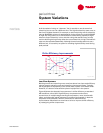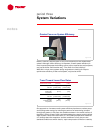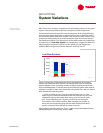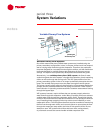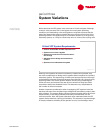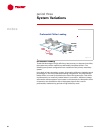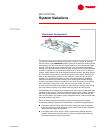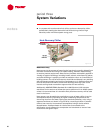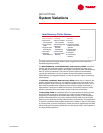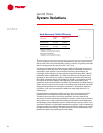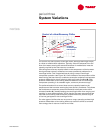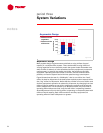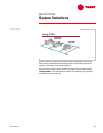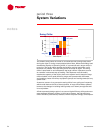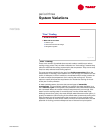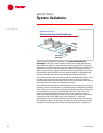
TRG-TRC016-EN 69
period three
System Variations
notes
For water-cooled centrifugal chillers, there are generally three methods of
implementing heat recovery.
The dual-condenser, or double-bundle, heat-recovery chiller contains a
second, full-size condenser that is connected to a separate hot-water loop.
It is capable of more heat rejection and higher leaving-hot-water temperatures
than an auxiliary condenser. The amount of heat rejected is controlled by
varying the temperature or flow of water through the standard condenser.
Chiller efficiency is degraded slightly in order to reach the higher condensing
temperatures.
An auxiliary-condenser, heat-recovery chiller makes use of a second, but
smaller, condenser bundle. It is not capable of rejecting as much heat as the
dual-condenser chiller. Leaving hot-water temperatures are also lower, so it is
often used to preheat water upstream of the primary heating equipment or
water heater. It requires no additional controls, and actually improves chiller
efficiency because of the extra heat-transfer surface for condensing.
A heat-pump chiller is a standard chiller (no extra shells are required) used
and controlled primarily for the heat it can produce in the condenser. The
evaporator is connected to the chilled-water loop, typically in the sidestream
position discussed earlier, but it only removes enough heat from the chilled-
water loop to handle the heating load served by its condenser. This application
is useful in a multiple-chiller system where there is a base or year-round heating
or process load, or where the quantity of heat required is significantly less than
the cooling load. The heating efficiency of a heat-pump chiller is the highest of
any heat-producing device.
Heat-Recovery Chiller Options
heat-recovery
(dual) condenser
auxiliary
condenser
heat pump
◆ No extra
condenser
◆ Large base-heating
loads or continuous
operation
◆ High hot-water
temperatures
◆ Controlled
◆ Good heating
efficiency
◆ Second, full-
size condenser
◆ Large heating
loads
◆ High hot-water
temperatures
◆ Controlled
◆ Degrades
chiller efficiency
◆ Second, smaller-
size condenser
◆ Preheating loads
◆ Moderate
hot-water
temperatures
◆ Uncontrolled
◆ Improves chiller
efficiency
Figure 77



